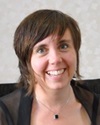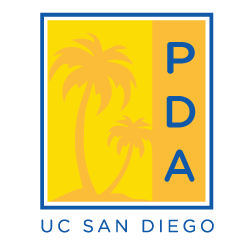
Heather Van Epps, Ph.D.
Principal Scientist, Translational Research | Seattle Genetics

- Interview Overview
Interview Overview
Interviews and Editing by: Alexandra Bortnick
Interview: October 2015
Transition: March 2011
1. Please list your previous department at UC San Diego and provide a brief description of the research you conducted?
I conducted my postdoctoral work with Dr. Yishi Jin in the Division of Biological Sciences, Neurobiology. From 2004-2008 I used genetics, cell biology, and molecular biology to determine molecular mechanisms of synapse formation in C. elegans. This work led to the identification of trans-acting factors that regulate RNA 3' end processing to control neurodevelopment. This revealed a new type of control for synapse formation.
2. Please describe your current job profile?
I work for company that makes antibody drug conjugates (ADCs) and other empowered antibodies for the treatment of cancer. Throughout my scientific career I have been interested in molecular mechanisms that control cellular transformation in normal and diseased states. My present work dissects the mechanistic aspects of ADC therapeutics within the complex biology of specific cancer indications. My current job profile includes ADC target identification, as well as characterization of the cellular mechanisms, intracellular trafficking, and molecular biomarkers that impact therapeutic potential.
3. What made you decide to transition into your current position?
I considered many types of positions when I transitioned from academia to industry. I ultimately chose a position that gave me the freedom to conceptualize and lead my own scientific projects and had the means to bring successful research to the clinic. My particular position is highly collaborative leading to exciting and fulfilling projects with talented colleagues. There is a strong demand for excellent research at the company, which is led from the top, our PhD trained CEO and research focused leadership.
4. Apart from the research you conducted, do you feel like anything in particular has helped you acquire your current position?
I enjoy applying my scientific training to different types of problems and constantly being challenged. As scientists we are trained to dissect and solve problems, a skill that can be applied to a wide variety scientific questions. I think it was important to show an ability and enthusiasm to adapt and solve new problems for my present position. As always, it is also essential to network in the scientific community. Not simply by just meeting people, but rather by creating meaningful relationships that can help guide you in your choices. I almost did not apply for the job that I ultimately took and love. A friend suggested that I might like the position, and he was right.
5. Please list some of the most striking similarities and differences between your postdoc and current position?
The strongest similarity between my postdoc and my present position is simply a demand to do good science. In both cases I was/am challenged to think deeply and be sure to complete the best science possible. Both environments prioritized constant critique and scientific evaluation of each other’s work. This process helps to make good science happen, leaving ego at the door.
A major difference is simply a corporate vs. academic focus. The major currency of academia is new knowledge leading to publication and grants, while the major currency of biotech is new knowledge leading to a product. Seattle Genetics is forward thinking and supports mechanistic scientific studies with a long-term vision. However, some science is best suited for academia, and other science is best suited for biotech. Each leads to unique constraints. The scientific field needs both types of science and a strong integration between the two.
6. Is there any specific challenge (during the entire process of transitioning) that you would like to highlight and, if so, how did you overcome it?
Probably the biggest challenge was thinking about the intellectual property and business aspects of my science. I am driven simply by science, so these other aspects were a new addition.
7. Please describe your goals and ambitions for the next 5 years?
I would like to expand and broaden any impactful science that I am able to accomplish. I would like to gain a deeper understanding of the complex process of making effective therapeutics, as I Iead research findings into the clinic.
8. What do you feel you could have done more, as a postdoc, to help prepare you for or acquire your current position?
I think the number one activity as a postdoc is always doing the best independent science possible. That being said, networking and connecting to people regarding the types of jobs one might enjoy is also important. As a postdoc I thought teaching at a primarily undergraduate institution (PUI) was perfect for me. Maybe if I had explored this more deeply I would have known it was not a good fit before I took a faculty position at a PUI. However, I may never have known without simply trying, and I gained valuable experience through the process.
9. What do you feel is the most important advice you can give to a current UCSD postdoc in order for them to obtain a position such as yours?
I think it is essential to not get too distracted as a postdoc. Your record as an independent scientist and your publications will ultimately land you that first great job. Nothing can replace a good track record. In addition network and engage other scientists personally and professionally. Develop those meaningful connections that will last through your career. Think openly about how your science can be applied, then explore and apply for positions. Always remember what you bring to the table for any position and develop those skills.
